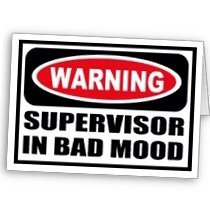So I have this friend Ryan. And he has a blog. And he writes good stuff. I even guest posted for him! And he's a mentor for Bloggers Helping Bloggers and, in general, just a pretty cool dude. But last week, he posed a question to his fellow Gen Y persons and because I'm technically not Gen Y (I mean, I could be depending on which measure you use but most of them put me at the tail end of Gen X), I couldn't respond to the survey.
So I'm responding in a post. Because it's a topic I feel strongly about and also, I don't like to feel left out (age discrimation is not cool, Ryan).
The gist of the survey was this: he wanted people to describe characteristics of a good and bad boss. Or, why did you leave a job? I feel that, having left multiple jobs over the years, I am an expert. And, despite the sentiment that most people leave a job because of their boss, I only did this once. I usually left because of pay or other reasons, but there was one instance–at the best job I had, sadly enough–where my boss was so unbearable I swore I would never again sell my soul for a paycheck.
What made her so bad? Well, the red flags were there during the interview and hiring process but I figured I could get over that. Little did I know that it would get worse. For instance:

Her moods. Moodiest. Woman. Ever. With this woman, you never knew what you were going to get. And that wasn't just day to day, it was hour to hour. I have never seen someone's moods change so quickly. And so often. I get that we all have our moments and that not every day is sparkles and unicorns. But when you are in charge of people, you need to have consistency. Your staff needs to know what they're getting. Changing your mood on a dime is not a great characteristic of a good leader. It sets a bad tone for morale.
Withholding information. In what I can only assume was a power play, she never gave anyone complete information. When your work is consistently a team effort, each person needs to know what's going on. She would never meet wight the teams as a whole; rather, she would meet individually so then, when we talked to each other, we'd all be confused. And look stupid. She was especially good at doing this prior to meetings with outside agencies. Then she could look like the superhero and come to our aid because we were just the dumb worker bees and she was the smart, informed head of the hive. Not giving your workers all the information they need to do their work so you can look good is a slap in the face to productivity.
Refusing to make decisions. She never made a concrete decision. Ever. And if she did, she refused to put it in writing. She did this so that if something did get screwed up, she couldn't be held accountable. She could just say “I didn't make that decision” or “you're remembering my words wrong”. Again, this was an attempt to always make herself look good at her staff's expense. When you are a leader, you need to make decisions and own up to them, good outcome or bad. That's why you're the boss. Not just to guide your stuff but to make those executive decisions. Failing to do so makes everyone question your leadership ability.
Lack of availability. I get that, as a supervisor, you have many, many meetings. With high level people, outside agencies and your staff. That's fine. In fact, it's more than fine. It's just part of your job. But this supervisor would disappear for hours on end, didn't respond to emails, had no cell phone, and insisted on not maintaining her calendar. This made her completely inaccessible to your staff (and her supervisor, but that's a different topic entirely), which made her an ineffective leader. Your staff needs to have access to you to discuss issues, information, and details. When you disappear and your staff needs you to finish a project, work gets held up. Not good for productivity.
Leading with fear, not respect. This particular supervisor was one of the most vindictive people I have ever encountered. If you disagreed with her, either in private or in public, she would make sure that you were punished. She would exclude you from big, high profile projects, critique your work with overly painstaking scrutiny, or basically find ways to embarrass you. She was rude, a bully, and often ignored common social decencies like saying “hello”. She threatened people to get what she wanted and fear of her sanctions was so high, people did whatever she wanted just to avoid them. But no one respected anything she did. You can't be a good leader if you don't earn any respect. And good people will leave.
No supervisor is perfect and many exhibit one or more of the characteristics. Sometimes on their own, sometimes together. That's fine. We all have our bad days and low moments. It's almost expected. But someone acts like this all day, every day, and that person is your supervisor, it makes for a hostile work environment. And low morale. And general unpleasantness.
If you are in a position of authority at work, don't abuse it. Treat your staff like they are capable, intelligent people. Don't demoralize them. Help them the best you can. Praise them when they do good work; don't just save your feedback for something wrong. Most people don't enjoy going to work. It's even worse when their supervisor is an asshat.
Don't be an asshat.

